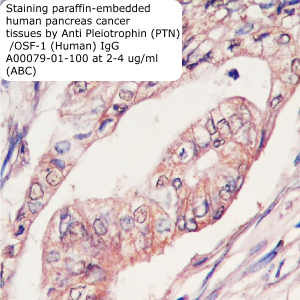
AVISCERA BIOSCIENCE
| |
| Home |
| New Products |
| Contact us |
Osteoblast-SpecificFactor-1 (OSF-1)/Pleiotrophin (PTN) Recombinant
|
| PTN is a growth factor differentially expressed
during fetal lung development. Wnt/β-catenin
pathway is involved in epithelial-mesenchymal interactions during lung
development. PTN and Wnt signaling pathways are partially overlapped
and linked to Notch pathway via Dlk1. Although several signaling
pathways have been identified to regulate normal lung development,
less is known about the cross-talking among these signaling pathways.
Several downstream genes of the Wnt signaling have been identified
including Dlk1, TTF-1, BMP4, c-myc, and Axin II. How these genes are
properly turned on/off to regulate lung development is not fully
understood. The elucidation of roles of PTN and Wnt signaling in fetal
lung development and its regulatory pathway may offer opportunities in
the development of new therapeutic strategies and drugs to resolve the
disorders associated with fetal lung development. Weng T, Liu L. Respir Res. 2010 Jun 18;11:80. |
|
Pleiotrophin (PTN) is expressed in vascularized human atherosclerotic plaques: IFN-{gamma}/JAK/STAT1 signaling is critical for the expression of PTN in macrophages. Li F, et al. FASEB J. 2010 Mar;24(3):810-22. Epub 2009 Nov 16. |
16-kDa fragment of pleiotrophin acts on endothelial and breast tumor cells and inhibits tumor development |
| Pleiotrophin (PTN) is a 136-amino acid secreted heparin-binding protein that is considered as a rate-limiting growth and an angiogenic factor in the onset, invasion, and metastatic process of many tumors. Its mitogenic and tumorigenic activities are mediated by the COOH-terminal residues 111 to 136 of PTN, allowing it to bind to cell surface tyrosine kinase-linked receptors. We investigated a new strategy consisting in evaluating the antitumor effect of a truncated PTN, lacking the COOH-terminal 111 to 136 portion of the molecule (PTNDelta111-136), which may act as a dominant-negative effector for its mitogenic, angiogenic, and tumorigenic activities by heterodimerizing with the wild-type protein. In vitro studies showed that PTNDelta111-136 selectively inhibited a PTN-dependent MDA-MB-231 breast tumor and endothelial cell proliferation and that, in MDA-MB-231 cells expressing PTNDelta111-136, the vascular endothelial growth factor-A and hypoxia-inducible factor-1alpha mRNA levels were significantly decreased by 59% and 71%, respectively, compared with levels in wild-type cells. In vivo, intramuscular electrotransfer of a plasmid encoding a secretable form of PTNDelta111-136 was shown to inhibit MDA-MB-231 tumor growth by 81%. This antitumor effect was associated with the detection of the PTNDelta111-136 molecule in the muscle and tumor extracts, the suppression of neovascularization within the tumors, and a decline in the Ki-67 proliferative index. Because PTN is rarely found in normal tissue, our data show that targeted PTN may represent an attractive and new therapeutic approach to the fight against cancer. |
| Ducès A, et al. Mol Cancer Ther. 2008 Sep;7(9):2817-27. |
 |
 |
|
| Name | Code No. |
Size |
Price |
| Pleiotrophin (PTN)/OSF-1 (Human) recombinant | 100 ug |
360.00 |
|
| Pleiotrophin (PTN)/OSF-1 (Human) recombinant | 00079-01-1000 |
1000 ug |
3200.00 |
| Antibody | |||
| Anti Pleiotrophin (PTN) /OSF-1 (Human) Rabbit IgG | 100 ug |
260.00 |
|
| Anti Pleiotrophin (PTN) /OSF-1 (Human) Goat IgG for WB | A00079-04-50 |
50 ug |
260.00 |
| Anti Pleiotrophin (PTN) /OSF-1 (Human) Rabbit IgG | 100 ug |
260.00 |
|
| Anti Pleiotrophin (PTN) /OSF-1 (Human) Rabbit IgG | 50 ug |
320.00 |
|